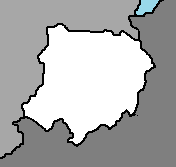Pangchu
Federation of Pangchu Pangchu | |
|---|---|
|
Flag | |
 | |
| Capital | Shingzhan |
| Official languages | Yuaneze, Pang |
| Government | |
| Mao Hanying | |
| Establishment | |
• Independence from Yuan | 2 January 1891 |
| Population | |
• 2020 estimate | 1,128,000 |
| Date format | mm-dd-yyyy |
The Federation of Pangchu, commonly referred to as Pangchu, is a small landlocked nation in Western Ausiana bordered by Yuan and Mandrao. The rugged Karaoram and Tu Shan mountain ranges occupy much of Pangchu's borders, as well as its western and southern regions. The Trans-Karaoram Tract region, administered by Yuan, are claimed by both Pangchu and Mandrao. It is home to a number of ethnic groups, including the Manda Pangchu, Manabans, Mandraos, Dasmistanis, and Yuaneze. There are more than a dozen autonomous prefectures and counties for minorities in Pangchu. Only about 9.7% of Pangchu's land area is fit for human habitation, with most settled in the central valley in or near the capital city of Shingzhan.
With a documented history of at least 2,500 years, a succession of people and empires have vied for control over all or parts of this territory. The territory came under the rule of the Heng dynasty in the 18th century, later replaced by the Republic of Yuan government until 1915, when it joined the United Communist and Socialist States. It became independent in 1999 as the rest of the UCSS collapsed. In recent decades, abundant oil and mineral reserves have been found in Pangchu and it is currently one of Ausiana's largest natural gas-producing region.
From the 1990s to the 2010s, the Yuaneze Pangchu independence movement, separatist conflict and the influence of radical Islam have resulted in unrest in the region with occasional terrorist attacks and clashes between separatist and government forces. These conflicts prompted the Yuaneze government to set up internment camps along the border of Pangchu, attempting to force its Muslim population to abandon the faith through thought reform. These measures have been collectively categorized as the Manda Pangchu genocide by some observers.
